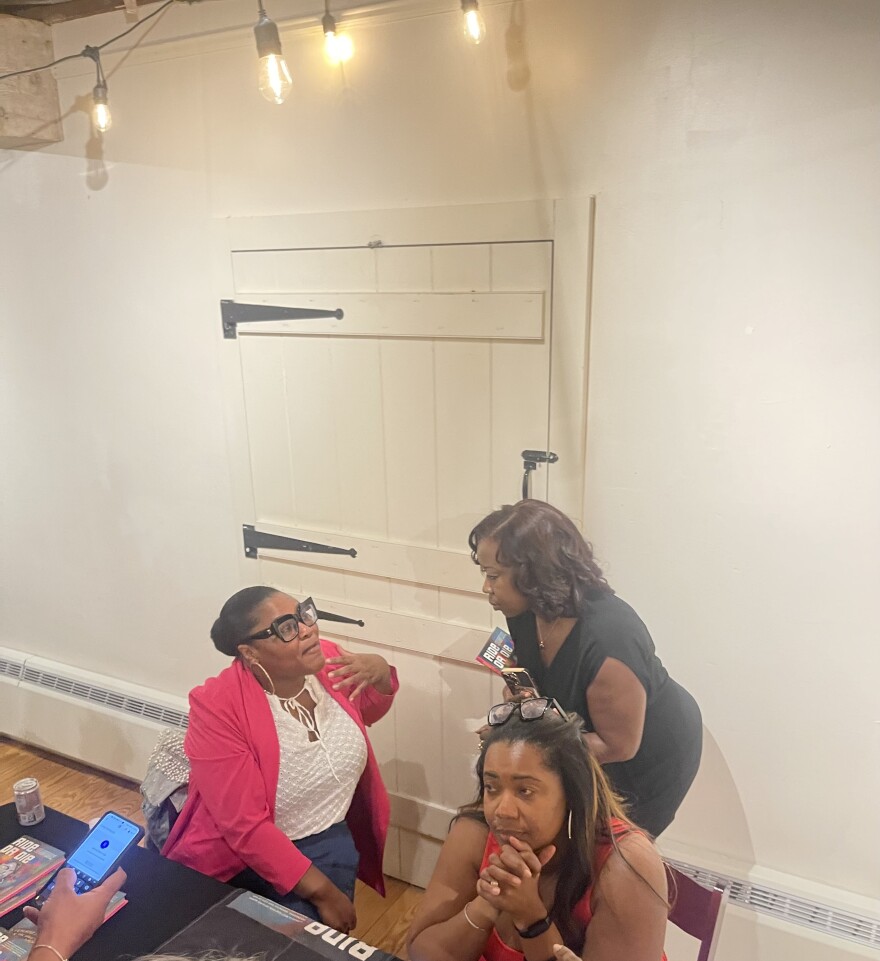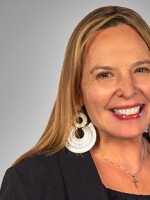BETHLEHEM, Pa. — Using examples from the music of Jay-Z, Common, Megan Thee Stallion and Lauryn Hill, author Shanita Hubbard was able to connect with Thursday's audience at the 1869 Luckenbach Mill, evoking applause and cheers.
Hubbard, who wrote “Ride or Die: A Feminist Manifesto for the Well-Being of Black Women,” was joined by Northampton Community College professor Andrew McIntosh at a program that was part of NCC’s year-long celebration “50 Years Down The Line: A Celebration of Hip Hop History & Culture.”
The book refers to the phrase “ride or die,” which indicates extreme loyalty to someone or something and was coined by the hip-hop trio L.O.X. in 2000.
Published last November, the book explores how putting others first has left Black women feeling depleted, overworked and unseen.
The free event was organized by Historic Bethlehem Museum & Sites, in partnership with Northampton Community College and the National Endowment for the Humanities.
“You know this expression, where white women get a cold, Black women have pneumonia?" Hubbard said.
"So if you can think about this uneven distribution of labor that's happening with a white woman, can you imagine what's happening in Black households, where there's this expectation for us to perform at a level 10 everywhere because we live in society, our loved ones, our family and communities, they know that we can?"
Sorry isn't good enough
Hubbard is a Soros Fellow and recipient of the James Baldwin writing residency.
During the two-hour chat, she spoke briefly about Jay-Z's album, “4:44,” in which the rapper apologizes for cheating during his marriage toBeyoncé.
The 2017 album is just one example of a rap star making amends for past wrongs, McInstosh said, which Hubbard said isn't good enough.
“The bar is on the floor guys, that's just people to hold up, right?" she said. "So as far as hip hop growing up, I feel like we're maturing, I don't know that we're grown yet, right?
"Because you can recognize your behavior, recognize that you did harm, that is literally only the first step.
“Now we have to talk about restoration. How do we restore what was harmed, right? How do we fix this? Like, OK, yes, you acknowledge all the people that you hurt, but what does restoration look like for that person?”
Speak up!

Hubbard and McInstosh, a hip-hop deejay and sociology professor at NCC's Monroe Campus, sparked a professional relationship in 2016.
Over the years, the two have become pals and found common ground in both music and topics that some people might find uncomfortable.
During the two-hour discussion, he asked Hubbard ways in which to be an “ally” to Black people and other underrepresented communities.
“It's very easy to come to an event like this, right?" Hubbard said. "And stand up and be like, well, Black Lives Matter, right?
"And I put up my square in 2020 on Instagram, but do it at home with your racist uncle that's saying some old nonsense stuff. Do it with your racist auntie that's homophobic. Have those tough conversations with your family."
“Do the hard work. Like, say it on sight. Do it when it matters. And have these conversations in your circles. "Shanita Hubbard
She continued by citing an example of how she was perceived as an “angry Black woman” during a discussion at a college.
At the time, the teachers were discussing the rights of transgender students and Hubbard voiced her opinion.
“The professor was like, 'Well you don't have to jump down my throat and yell at me,'" she said. "In that moment, whatever I would have said, I would have been an angry Black woman.
"I [wanted] to reiterate my point, but I'm already an angry Black woman.”
After the meeting concluded, she said, other teachers approached her in support.
“How y'all say that in that meeting? Say it right now! Don't sit there and remain," she said. "This silence is complicit. It does not matter if you whisper to me when it's over.
"That's not great. That's not being an ally. That's telling me, I saw you drowning on our watch. Do the hard work. Like, say it on site. Like, do it when it matters.
"And have these conversations in your circles. I know it's hard. You don't think I [know] a — holes from homophobic uncles that say ridiculous s — and I have to make a decision.”
Book tour
Hubbard said that among her stops on her book tour was one in Paris. The visit came three years after she was originally scheduled to visit the City of Lights, which was canceled because of the coronavirus pandemic.
While reading to a group of mostly white people, Hubbard said, she was excited to find that her book resonated with a diverse group of women.
“My book is very much literally centered around a Black woman," she said. "And not only that, it's a very Black American woman's experience.
"I just didn't know culturally how any of it was going to translate. I read the chapter, I'm talking about Cardi B, and I'm talking about sex and agency. I'm also talking about the politics of Black women's bodies, right? And how we're seen as hyper-sexual, and what it means to take Black agency, and all this other stuff.
“I didn't know how that was going to go. And they were, like, was really into it. It was, like, it was a really long line.
"They were, like, 'Oh my God, I saw myself into so much. I was like, really? Right. So one of the things that took away some of these experiences are universal."
To learn more about Hubbard's book, go to Hubbard's website.


